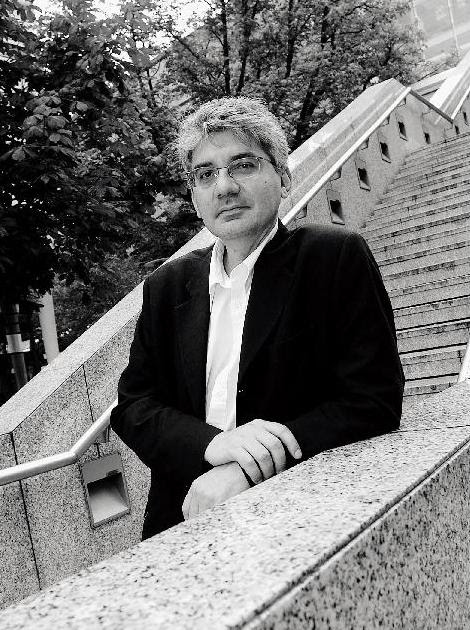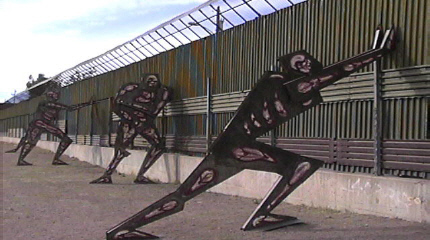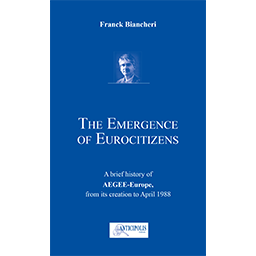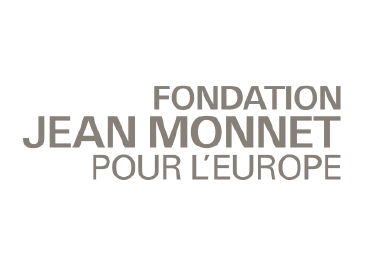Turkey-Ukraine, two countries which will not join the EU, the Balkans, last enlargement of the next 20 years, Russia, the key to solve the EU-Turkey problem
The increasing difficulties of the process of Turkey entering the European Union contrasts with the progressive entry “piece by piece” of the former Yugoslavia/1 (Slovenia is already a member and Croatia is starting its integration process while proposals to integrate the other Balkan countries multiply)/2.
This contrast is all the more striking if one compares the evolution in public opinion with regard to the EU in the various countries concerned. In Turkey, the image of the EU and prospect for integration have been deteriorating regularly since the end of 2004 (the symbolic date of the EU “green light” to negotiations); whereas in the countries of former Yugoslavia the opposite trend can be seen.
As far as the European public opinion is concerned, with a general background of “tiredness” with the endless enlargement/3, the team of LEAP/E2020 notes an essential evolution which can explain these divergent developments: European citizens now reject two very specific elements of the enlargement, namely on the one hand “big” enlargements which imply countries with large populations which can call into question the great internal balance of the EU, and on the other hand, enlargements which “do not finalize” the European construction but which, on the contrary, push identity and limits towards more uncertainty.
Under these conditions, it is not surprising to see a strong and increasing popular opposition to the integration of Turkey or the Ukraine (which does not even have the statute of a candidate), whereas the integration of the Balkans, without raising enthusiasm, does not cause strong oppositions. Indeed, the accession of Turkey or the Ukraine to the EU would involve a fundamental redefinition of the identity of the EU and its limits; whereas the integration of the Balkan countries seems a “completion” of the work of a continental unity started 50 years ago. In addition, the populations concerned in the Balkans are proportionally very small compared with those of the EU, whereas Turkey or Ukraine would imply demographic upheavals in the EU.
For the researchers of LEAP/E2020, who are convinced that the only internal political force in the EU is now on the side of the public opinion/4 (since the institutions lack legitimacy, operational competence and vision for the future), the evolution of the relations of the EU with Turkey and the Ukraine on the one hand, and with the Balkan countries on the other hand, is thus easy to anticipate and has only a very little to do with the official agenda of the EU. Future enlargements are indeed as much out of reach of institutional decisions as the future of the EU constitutional project. Neither Turkey, nor Ukraine will enter the EU in the twenty years to come. However, at the same time, and even in a period of one decade, the whole of the Balkans will be integrated into the EU.
LEAP/E2020 believes that in order to avoid a dangerous dead end, at the latest sometime between now and 2010, after the next European elections which throughout all the EU will sanction the political parties in favour of the “great Eastward enlargement”, the EU will be obliged to propose Turkey with a “strategic partnership” and clearly explain that it is the alternative imposed on a process of integration here but to the rise of anti-Turkish feelings in the EU, and anti-European feelings in Turkey. At this stage, the Turkish power, in its dual form of a “democrat-Islamic” and “military-secular” set-up will be largely open to such an alternative since it does not have any interest in a real integration. Indeed, for each of the two components of the Turkish power, EU integration is useful only as a “project” making it possible to mobilize the population, but in no case as an “effective realization” destroying the non secular or non democratic bases of one or other group.
Paradoxically, according to LEAP/E2020 researchers, the solution to this EU-Turkey “fools game”, which has gone on for 40 years, will be provided by Russia. Turkey will indeed reject any alternative to the integration which would place it in a zone known as “vicinity” where it would be together with the Maghreb countries, Egypt, Lebanon… The Turks (leaders and population), for obvious historical reasons, believe they belong to another “category of players” than these countries. However, there is currently a country which belongs to the “category” to which the Turks estimate they belong (i.e. the “big players”) and who does not wish to enter the EU, while wanting to build a particular partnership with it, “a strategic partnership”, and it is Russia.
As pointed out by the LEAP/E2020 team, which took part in the 2020 GlobalEurope EU-Russia seminar last October in Moscow/5, what is missing today in the EU offer to Turkey is precisely a type of partnership allowing Turkey to walk away from the obvious dead end that the process of integration is “with their heads held high”. To be seen in the same category as Moscow is undoubtedly better – seen from Ankara – than being classified with Tunis, Beirut or Algiers. For the EU, the benefit is obvious since that removes one of the most corrosive phenomena in its relationship with the public opinion. For Moscow, such a comprehension can only help to convince the reticent community institutions to give up their condescending attitude and really begin a true and long-lasting partnership. This evolution is in fact already in process because of questions relating to energy/6.
Franck Biancheri
(1961/2012)
In GEAB 6 published June 16, 2006
(Confidential letter – GlobalEurope Anticipation Bulletin Nr 6 – June 16, 2006 © Copyright Europe 2020 / LEAP – 2006 – All rights reserved)
Read the GEAB: http://geab.eu/
[divider]
1/ To which will be added that of Albania, if only because the Kosovo situation is closely linked with the integration of the three entities which are Serbia, Kosovo and Albania.
2/ ndlr: Croatia joined the EU on July 1st, 2013
3/ Beyond survey results which clearly indicate this “dissatisfaction” regarding enlargement, the LEAP/E2020 team has the good fortune to be regularly on the ground throughout the EU and thus is able to qualify this analysis. In almost all member states, the question of Turkey’s integration has left the field of “surveys” and has entered the field of national vote decisions. Henceforth, among all questions which are likely to determine the national vote of a great number of voters, and for the great majority of them, the question of Turkey’s integration has only one answer is suitable, that is opposing the integration. It only takes a quick look at the main candidates for the national elections in the various countries of the EU to understand that the question of integration will have no “political supporter” in the EU in about 2 or 3 years.
4/ See the Democratization and Institutions sections of the Europe 2020 site, as well as the Vision Europe 2020 publication.
5/ See Europe2020 : http://www.europe2020.org/en/anticipation/globalII/program2.htm
6/ The long-term weakening of the American influence in Europe deprives Turkish integration of its main supporter.
[divider]
Turquie-Ukraine, les pays qui n’intègreront pas l’UE, Balkans, le dernier élargissement des 20 prochaines années, Russie, la clé du problème UE-Turquie
Les difficultés croissantes que rencontre le processus d’adhésion de la Turquie à l’Union européenne contrastent avec la mise en place progressive d’une accession « par morceaux » de l’ex-Yougoslavie/1 (la Slovénie est déjà membre et la Croatie entame son processus d’adhésion tandis que se multiplient les propositions pour intégrer les autres pays balkaniques)/2.
Ce contraste est d’ailleurs d’autant plus saisissant si l’on compare l’évolution des opinions publiques en ce qui concerne l’UE dans les différents pays concernés. En Turquie, l’image de l’UE et de la perspective d’adhésion se détériorent régulièrement depuis la fin 2004 (date symbolique du « feu vert » européen aux négociations) ; alors que dans les pays de l’ex-Yougoslavie on constate l’évolution inverse.
Pour les opinions publiques européennes, sur fond généralisé de « ras-le-bol » d’un élargissement sans fin/3, l’équipe de LEAP/E2020 constate une évolution essentielle qui peut expliquer ces évolutions divergentes : les citoyens européens rejettent désormais deux éléments bien particuliers de l’élargissement, à savoir d’une part les « gros » élargissements qui impliquent des pays à forte population pouvant remettre en cause les grands équilibres internes de l’UE, et d’autre part, les élargissements qui ne « finalisent » pas la construction européenne mais qui au contraire la projettent toujours plus loin dans une identité et des limites incertaines.
Dans ces conditions, il n’est pas surprenant de constater une forte et croissante opposition populaire à l’adhésion de la Turquie ou de l’Ukraine (qui n’a même pas de statut de candidat), alors que l’adhésion des Balkans, sans soulever d’enthousiasme, ne suscite pas d’oppositions marquées. En effet, l’accession de la Turquie ou de l’Ukraine à l’UE entraînerait une redéfinition fondamentale de l’identité de l’UE et de ses limites ; alors que l’adhésion des pays balkaniques apparaît comme une « finition » du travail d’unité continentale entamé il y a 50 ans. Par ailleurs, les populations concernées dans les Balkans sont très faibles proportionnellement à celles de l’UE. Alors que Turquie ou Ukraine impliqueraient des bouleversements démographiques dans l’UE.
Pour les chercheurs de LEAP/E2020, qui sont convaincus que désormais la seule force politique interne dans l’UE se trouve du côté des opinions publiques/4, puisque les institutions sont en panne durable de légitimité, de compétence opérationnelle et de vision d’avenir, l’évolution des relations de l’UE avec la Turquie et l’Ukraine d’une part, et les pays balkaniques d’autre part, est donc aisément anticipable et n’a que très peu de choses à voir avec l’agenda officiel de l’UE. Les élargissements à venir sont en effet tout autant hors de portée des décisions des institutions que ne l’est l’avenir du projet de constitution de l’UE. Ni la Turquie, ni l’Ukraine n’adhèreront à l’UE dans les vingt années à venir ; en revanche, dans le même temps, voire même dans le temps d’une décennie, l’ensemble des Balkans sera intégré à l’UE.
Selon LEAP/E2020, pour éviter une impasse dangereuse, au plus tard d’ici 2010, après les prochaines élections européennes qui, à travers toute l’UE, sanctionneront les partis politiques favorables aux « grands élargissements orientaux », l’UE sera obligée de proposer à la Turquie un « partenariat stratégique » en signifiant clairement que c’est l’alternative imposée à un processus d’adhésion ne menant nulle part sinon à la montée de sentiments anti-Turcs dans l’UE, et anti-Européens en Turquie. A cette date, le pouvoir turc, dans sa forme duale de « démocrates-islamiques » et de « militaires-laïcs » sera d’ailleurs très largement demandeur de cette alternative puisqu’il n’a aucun intérêt à une adhésion réelle. En effet, pour chacune des deux composantes du pouvoir turc, l’adhésion à l’UE n’est utile que comme « projet » permettant de mobiliser la population, en aucun cas comme « réalisation effective » détruisant les bases non démocratiques ou non laïques de l’un ou l’autre groupe.
Paradoxalement, selon les chercheurs de LEAP/E2020, la solution au « jeu de dupes » UE-Turquie, qui se poursuit depuis 40 ans, sera fournie par la Russie. La Turquie refusera en effet toute alternative à l’adhésion qui la placerait dans un espace dit de « voisinage » où elle côtoierait les pays du Maghreb, l’Egypte, le Liban … Les Turcs (dirigeants et peuple confondus), pour des raisons historiques évidentes, estiment appartenir à une autre « catégorie de joueurs » que ces pays-là. Or, il existe actuellement un pays qui appartient à la « catégorie » à laquelle les Turcs estiment appartenir (c’est à-dire les « Grands »), et qui ne souhaite pas entrer dans l’UE tout en voulant construire un partenariat particulier avec elle, « un partenariat stratégique » : c’est la Russie.
Comme l’a fait remarquer l’équipe LEAP/E2020 qui participait au séminaire GlobalEurope UE-Russie 2020 en Octobre dernier à Moscou/5, ce qui manque aujourd’hui dans l’offre de l’UE à la Turquie c’est justement ce type de partenariat permettant à la Turquie de sortir « par le haut » de l’impasse évidente que constitue le processus d’adhésion. Etre dans la même catégorie que Moscou, c’est assurément autre chose, vu d’Ankara, qu’être classé avec Tunis, Beyrouth ou Alger. Pour l’UE, le bénéfice est évident puisque cela supprime l’un des phénomènes les plus corrosifs qui soit pour ce qui est de sa relation à son opinion publique. Pour Moscou, une telle compréhension ne peut qu’aider à convaincre les institutions communautaires réticentes d’abandonner leur attitude condescendante pour réellement s’engager sur un vrai partenariat durable. Cette évolution est en fait déjà en cours du fait même des questions liées à l’énergie/6.
Franck Biancheri
(1961/2012)
pour le GEAB 6 édité le 15 juin 2006
(Lettre confidentielle ‘GlobalEurope Anticipation Bulletin’ N°6 – 15 juin 2006 © Copyright Europe 2020 / LEAP – 2006 – ISSN 1951-6177 – Tous droits réservés)
Consultez le GEAB: http://geab.eu/
[divider]
1/ Qui sera complétée par celle de l’Albanie, ne serait-ce que parce que la question du Kosovo lie étroitement l’intégration des trois entités que sont la Serbie, le Kosovo et l’Albanie.
2/ ndlr: la Croatie rejoint l’UE le 1er juillet 2013
3/ Au-delà des sondages qui indiquent clairement ce « ras-le-bol » des élargissements, l’équipe de LEAP/E2020 a la chance d’être régulièrement sur le terrain dans toute l’UE et de pouvoir donc qualifier cette analyse. Ainsi, dans la quasi-totalité des Etats-membres, la question de l’adhésion turque a quitté le domaine des « sondages » pour entrer dans les décisions d’intention de vote national. Dorénavant, parmi les questions qui détermineront le vote national d’un grand nombre d’électeurs se trouve la question de l’adhésion de la Turquie et pour la grande majorité d’entre eux, une seule réponse susceptible d’emporter le vote, à savoir l’opposition à l’accession. Il suffit de regarder les principaux candidats aux élections nationales dans les différents pays de l’UE pour comprendre que la cause de l’adhésion n’aura plus de « champion politique » dans l’UE d’ici 2 ou 3 ans.
4/ Voir les sections Démocratisation et Institutions du site Europe 2020 et l’ouvrage Vision Europe 2020
5/ Voir Europe2020 : http://www.europe2020.org/fr/anticipation/globalII/program2.htm
6/ L’affaiblissement durable de l’influence américaine en Europe prive par ailleurs l’accession de la Turquie à l’UE de son principal champion.
[divider]






